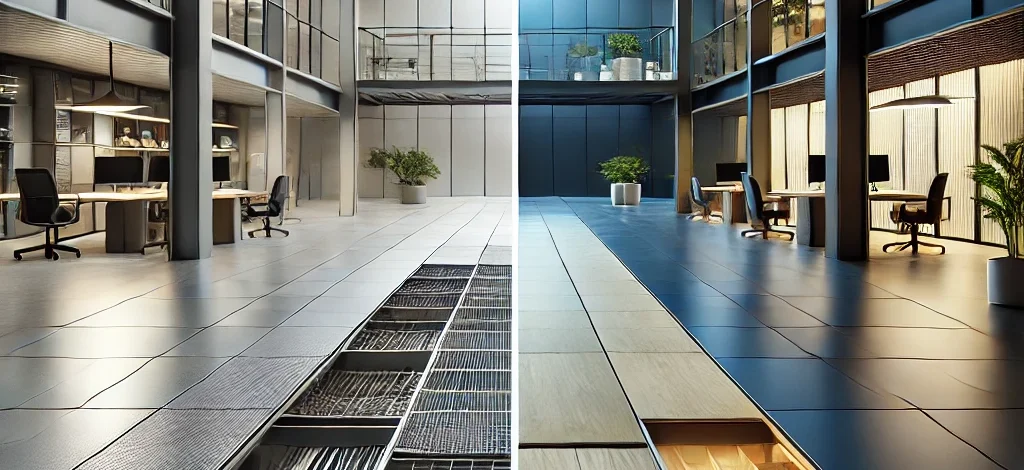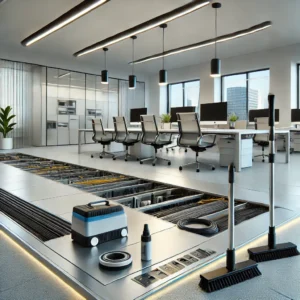Steel vs. Calcium Sulfate Raised Flooring: Key Differences
Explore the critical differences between steel and calcium sulfate raised flooring to make an informed decision for your space. Discover which material offers better durability, cost-efficiency, and suitability for your unique needs.
Steel vs. Calcium Sulfate Raised Flooring: Key Differences
Raised flooring systems are essential for modern spaces, from data centers and offices to high-traffic commercial areas. The choice of material plays a pivotal role in performance, durability, and cost-effectiveness. Two of the most popular options are steel and calcium sulfate raised flooring. While both have unique advantages, understanding their key differences ensures you select the ideal flooring for your requirements.
What is Steel Raised Flooring?
Steel raised flooring systems are constructed using galvanized or powder-coated steel panels. These panels are known for their exceptional strength, load-bearing capacity, and resistance to environmental factors. Steel flooring is a preferred choice for spaces requiring heavy-duty usage and long-lasting performance.
What is Calcium Sulfate Raised Flooring?
Calcium sulfate raised flooring systems utilize a core made from natural gypsum (calcium sulfate) combined with cellulose fibers. These panels are environmentally friendly and offer superior acoustic insulation and fire resistance, making them ideal for office spaces and areas prioritizing sustainability.
Key Differences Between Steel and Calcium Sulfate Raised Flooring
1. Durability
- Steel Flooring: Highly durable and resistant to wear and tear, suitable for heavy equipment and high-traffic areas.
- Calcium Sulfate Flooring: While durable, it is more prone to scratches and requires careful handling.
2. Load-Bearing Capacity
- Steel Flooring: Exceptional load-bearing capacity, ideal for data centers and industrial environments.
- Calcium Sulfate Flooring: Adequate for office and light commercial use, but less robust under extreme loads.
3. Acoustic Properties
- Steel Flooring: Moderate sound insulation, may require additional underlays to minimize noise.
- Calcium Sulfate Flooring: Excellent sound insulation, reducing noise for a quieter environment.
4. Environmental Impact
- Steel Flooring: Requires significant energy to produce but can be fully recycled.
- Calcium Sulfate Flooring: Made from natural materials and offers better eco-friendliness.
5. Fire Resistance
- Steel Flooring: High resistance but can conduct heat.
- Calcium Sulfate Flooring: Outstanding fire resistance and low thermal conductivity.
6. Cost
- Steel Flooring: Generally more expensive due to raw material costs and processing.
- Calcium Sulfate Flooring: More budget-friendly and accessible for a variety of projects.
7. Weight
- Steel Flooring: Heavier, requiring strong substructures.
- Calcium Sulfate Flooring: Lighter, easier to install, and suitable for retrofitting.
Specifications Table
| Feature | Steel Raised Flooring | Calcium Sulfate Raised Flooring |
|---|---|---|
| Durability | High | Moderate |
| Load-Bearing Capacity | Exceptional | Adequate |
| Acoustic Properties | Moderate | Excellent |
| Fire Resistance | High | Outstanding |
| Environmental Impact | Recyclable | Eco-friendly |
| Cost | Higher | Lower |
| Weight | Heavy | Light |
| Installation | Complex | Easier |
| Maintenance | Low | Moderate |
| Surface Finishes | Limited | Wide Variety |
| Thermal Insulation | Moderate | High |
| Scratch Resistance | High | Lower |
| Moisture Resistance | Excellent | Moderate |
| Lifespan | Long | Moderate |
| Ideal Use Cases | Data Centers, Industrial | Offices, Commercial Spaces |
FAQs
1. What are the main advantages of steel raised flooring?
Steel raised flooring offers unmatched durability, exceptional load-bearing capacity, and long-term reliability, making it perfect for demanding environments like data centers.
2. Why choose calcium sulfate raised flooring?
Calcium sulfate raised flooring is environmentally friendly, offers superior acoustic and fire-resistant properties, and is more budget-friendly, making it ideal for office and commercial spaces.
3. Which raised flooring option is better for sound insulation?
Calcium sulfate raised flooring provides better acoustic insulation, reducing noise and creating a quieter environment.
4. How does installation differ between steel and calcium sulfate flooring?
Steel flooring is heavier and requires more effort to install, while calcium sulfate flooring is lighter and easier to handle, making it suitable for retrofitting projects.
5. Are both flooring options eco-friendly?
While steel is recyclable, calcium sulfate is more eco-friendly due to its natural composition and lower production impact.
Why Choose Steel vs. Calcium Sulfate Raised Flooring: Key Differences?
Understanding the differences between steel and calcium sulfate raised flooring helps you make an informed decision tailored to your specific needs. This comparison offers insights into:
- Performance: Steel excels in durability and load-bearing, while calcium sulfate leads in acoustic and fire resistance.
- Cost-Effectiveness: Choose based on your budget without compromising quality.
- Sustainability: Opt for environmentally friendly solutions.
By weighing the pros and cons of each material, you can select the ideal flooring system for your space.
Pros and Cons Table
| Pros (Steel Flooring) | Cons (Steel Flooring) |
| High durability | Higher cost |
| Exceptional load-bearing capacity | Heavier, requires strong substructures |
| Excellent moisture resistance | Moderate acoustic properties |
| Pros (Calcium Sulfate Flooring) | Cons (Calcium Sulfate Flooring) |
| Superior acoustic and fire resistance | Prone to scratches |
| Eco-friendly and budget-friendly | Lower load-bearing capacity |
| Easier installation | Moderate moisture resistance |
|
|
|
|



